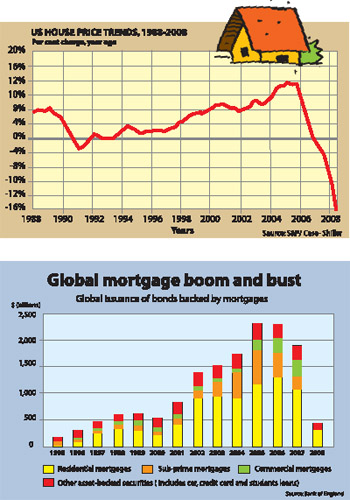Global financial crisis - no direct impact on Lanka
By Lalin FERNANDOPULLE
[email protected]
The global financial crisis will not have a direct impact on Sri
Lanka's economy since the country has less involvement with financial
institutions which have been hit by the crisis, said Director, Merchant
Bank of Sri Lanka PLC, Dr. Ranjith Bandara.
He was addressing a seminar on the 'Global Credit Crisis' organised
by the Merchant Bank of Sri Lanka recently.

Dr. Bandara said due to the global nature of the current crisis Sri
Lanka will not be able to fully avoid the impact of the crisis.
The tourism industry and key export sectors such as textiles, tea and
rubber will be affected by the global economic slow down.
The US and Euro Zone economic downturn will have a negative impact on
the textile and garment exports.
Around 50 per cent of the country's garments were exported to the US
and 40 per cent to the European Union last year.
Rising interest rates and inflationary pressure, the appreciation of
the US dollar, the high public expenditure and a war budget will worsen
the situation on Sri Lanka. Foreign investors will be compelled to
withdraw investments if the crisis worsens.
"Sri Lanka's economy has been resilient to various external shocks
but if there are no balanced policies and prudent management the global
recession will have adverse consequences on the country", he said.
The loss of the global financial crisis is estimated at US$ 945
billion of which US$ 225 billion is due to outstanding loans and US$ 720
billion due to losses on securities.The world GDP growth projected by
the IMF will slow down by 2 per pent or more and as a result the GDP per
capita is expected to fall.
Dr. Bandara said though Asia is resilient to the crisis, trade
expansion will reduce due to the decline in commodity prices and there
will be a drop in export volumes to the US and Europe.
Developing rural industries and small and medium enterprises will
help gain economic stability and face the global challenges. Rural
industries make a significant contribution to the GDP of the country.
Assistance for the SME sector will have a positive impact on the
economy.
"With steps being taken by the government to strengthen the economy,
bridge the regional disparity and strategic partnership with donor
countries such as Iran the impact of the credit crunch could be low", he
said.
Partner, PricewaterhouseCoopers Chartered Accountants, Sujeewa
Muddalige said the premium on emerging market debt over the US Treasury
has widened in the recent weeks, and a host of currencies has fallen
against a resurgent US dollar.
Foreigners have sold more Asian stocks than they have bought this
year, according to the Standard Chartered Bank. They have pulled out US$
31 billion from South Korea, US$ 10 billion from Taiwan, US$ 8 billion
from India and nearly US$ 4 billion from Thailand.
The cumulative fall in major stock markets since the crisis erupted
in July this year is over 10 per cent which has erased a staggering US $
4.5 trillion from global stock markets in four weeks.
Policy makers should identify the early warning of a future financial
crisis, the critical gaps in the international regulatory and accounting
architecture and rate complex securities that will provide information
on risk to investors.
The global liquidity crisis is the prolonged economic expansion and
abundance of leveraging in the western world.
George Soros, a leading investor said the current financial crisis is
a result of 60 years of good time.
Muddalige said when the economies were doing well no one questioned.
The people indulged in high consumerism with credit debts running into
alarming amounts. A US citizen uses around 10-15 credit cards and the
total debt increased four times since 1995-2005.
The global crisis is the manifestation of the collapse of the US
credit and housing bubbles. Lending to poor quality (subprime) credit
risks to finance home purchases has been stretched to the maximum
compared to other segments of the credit markets. US housing prices
increased by 52 per cent from 1992 to 2006. |

